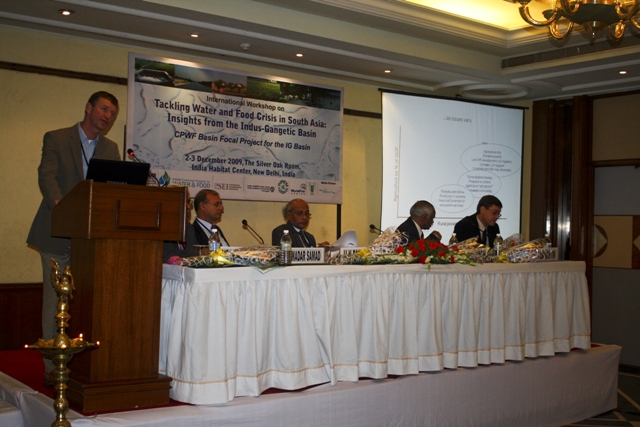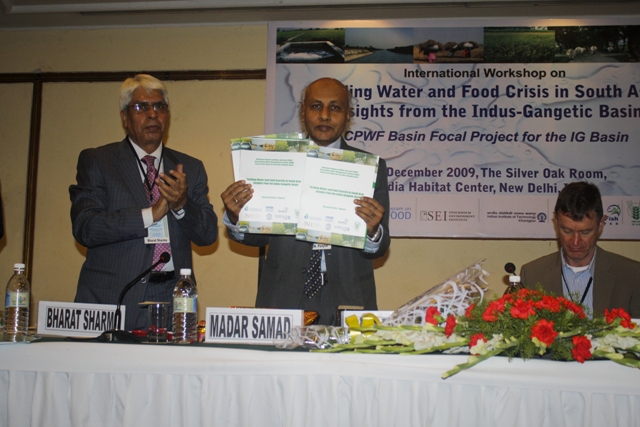Unrestricted flow, reproduction and redistribution of data has been a great concern with most of the projects and research establishments in India. As we heard the Secretary of Ministry of Water Resources voice his recommendations on the ways to tackle the looming water crisis, and the steps that the ministry is taking towards this, we thought of first putting down the highlights of the talks raw, before we get back to them in a detailed manner.
While we compile together all the presentations and papers, here' s a quick update on the talks from the first day. On the research challenges for improving the use and productivity of natural resources in India, Dr. Anil Singh, Deputy Director General, Natural Resource Management, Indian Council of Agriculture Research had an interesting observation linking fertilizer use with water consumption in the gangetic basin. It is assumed that both of these factors impact the crop productivity and this needs to be explored further.
He suggests:
- India needs a ground water management policy.
- The issues discussed in the workshop cut across all the basins in the country and have long term implications.
- Gangetic Basin is critical for our food security
- The attempt to reduce the cropping area would be a difficult proposition. We would have to live with it... area under cultivation is poised to increase and we might want to consider technological options like the cultivation of aerobic rice, SRI etc.
- Another answer is mechanization in the agricultural sector. This may enhance efficiency.
- We must consider a shift to precision farming as well.
Two new publications from the IGB project were released today by the Chief Guest at the workshop, U.N. Panjiar, the Secretary to the Ministry of Water Resources, Government of India. Releasing the reports, Mr. Panjiar presented the government's perception of the present water situation along with some statistical data on the water usage. The challenges of food security and water security are global. Climate change has been an increasing concern too. He observes food security, water secutiry and climate change are closely related. The objective of food security cannot be achieved without water security.
U.N. Panjiar releasing the IWMI publications on Indus-Gangetic Basin with Bharat Sharma and Madar Samad

Anil Singh delivering his speech
Mr. Panjiar puts forward the following recommendations, stating that these could possibly help us manage well, the problem of water crisis.
- A comprehensive water database should be developed.
- Assessment of impact of climate change on rescources is required.
- Promotion of citizen and state action for conservation of resources.
- Focus on overexploited areas.
- 15% aquifers in country are overexploite and another 15 are critical. We must increase water reuse by 20%.
- Basin level resource management is essential.
- Irrigation potential crated and irrigation potential utilized must be to the optimal levels.
- In agreement with Simon Cook, he emphasizes that efficiency is an important issue.
- Water, energy and food productivity are closely linked. This relation and interdependence must be explored.
- Remote Sensing techniques are critical in agriculture and basin management.
Government of India has launched a Water Resource Information System and most of the data is being made public under this project! Policy too, is being revised to make most of the data public and it is projected to be launched by the end of current financial year. Launching a National Water Mission of India is also being mulled over. (Read the related documents here)
Stating that it is important to ensure technology transfer to farmers to achieve “more crop per drop” he talks about a project conducted by the ministry in which 5000 demonstrations of relevant farm technologies were given to the farmers. The interim report of this project indicates that use of such technological interventions is important in improving the yield of the crop and improve water efficiency!
Looking beyond the water crisis & asking the right questions
"Water bills set to rise over 100% in new year" reads the loud headline in the Times of India, in New Delhi today. At the India Habitat Center here, the timing couldn't have been any better.
Times of India, New Delhi, Dec 2, 2009 (Read here)
Gathering in the city which just woke up to the water pricing issues and trying to ascertain the loss of revenue that it may have caused all this while, the forum would see the researchers from institutes like IWMI, World Fish, SEI, IIT, IARI, Jadavpur University presenting their findings from a two year long study on the Indus and Ganges rivers.
My guess is that, having the Secretary of Ministry of Water Resources, Government of India as the chief guest might just ensure (to a certain extent) that the results and findings would be heard and considered.
Madar Samad opens the workshop by emphasizing the need for research and for appropriate policy recommendations. This workshop on the IGB according to him, is the first step towards that goal. This would be followed by sharing the data to facilitate informed discussions.
The deliberations would ensure that there is a good interaction with the stakeholders and Civil Society Organizations to effect policy changes. From the sessions here we look forward to some intensive discussions that, towards the end can enhance the quality and relevancy of the research done so far

Simon Cook (speaking)
On CPWF Basin Focal Projects: Global Initiative for Local Solutions, Simon Cook (BFP Coordinator) deems this as a very important project. Here’s what he touches upon-
Challenge Program helps address an important problem of food crisis.- This has a bottom up approach. Over 60 projects have been initiated by IWMI in different continents.
- How do these address the globally relevant problems? Through this question came out the Basin Focal Program, in 2002.
- Water crisis has been making a myriad of headlines… from flood crisis in Mozambique, Yellow river, the Meckong , from Brazil , Andes and many more.
- All these headlines focus on crisis! We need to ask, "What can be done about it?"
- Behind every crisis is a broader solution.
- He discusses the situation that this challenge program is addressing.
- BFP addresses-
- How does the global crisis look at the ground level?
- What is the link between water food and poverty?
- How do river basins support people?
- How do these link together?
- Talks about the disconnect between what we perceive as problems (the researchers) and what the development problems are!
- Elaborates on the research plan referring to the observation that we need to connect to the above disconnect and this is the element that BFP addresses.
- These projects are very different but they have some sort of an order in the development trajectory. Non agricultural activity is increasingly getting important.
- Here we have a situation in Latin America where agri activity is a smaller part of the economy.
- Economies tend to move away from this and lead to shrinking agriculture and increasing poverty.
- Because of the depleting resources the people tend to indulge in livelihood activities, patterns of which are complicated and have fine linkages.
- Agriculture is increasingly being left behind leading to increased vulnerability!
- The livelihoods are influenced by 4 water related factors
- Availability/scarcity
- Access – who gets it ..how is it shared
- Hazard- how are people hit by water related problems like floods and draughts
- Use and Abuse of water – this, in his opinion is the most neglected aspect
(He finds this scheme useful in organizing his observations on poverty, livelihood and water.)
Before we find time to upload pictures from the workshop, here's a quick view of the participants. (Photo Credit: Prateek) Click for larger image
/articles/need-comprehensive-water-database-says-dr-anil-singh-icar
